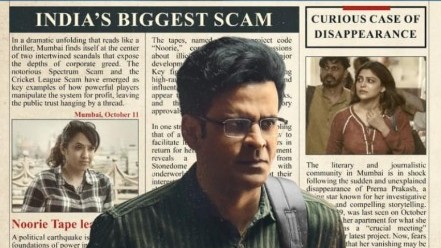Despatch Review: Manoj Bajpayee, Shahana Goswami’s Film Is A Grim Dispatch Of Unrealistic Noir |
Title: Despatch
Director: Kanu Behl
Cast: Manoj Bajpayee, Shahana Goswami, Arrchita Agarwaal, Ritu Parna Sen, Veena Mehta
Where: Streaming on Amazon Prime Video
Rating: 2.5 Stars
Mumbai, the city of dreams and crime, serves as both stage and character in Despatch, a noir film that sacrifices plausibility for shock value. Bookended by brazen daylight shootouts, it attempts to tell a story of investigative journalism gone wrong, but while the bullets hit their mark, the narrative misses.
Inspired by the life and tragic death of Jyotirmoy Dey, the real-life crime journalist assassinated in 2011, the film loosely reimagines his story with a lurid and exaggerated interpretation.
Manoj Bajpayee stars as Joy Bag, an ambitious tabloid journalist who dives headfirst into Mumbai’s murky underworld. Yet, his portrayal of Joy—a man who straddles the lines of morality with reckless abandon—comes across as lackluster, as though Bajpayee himself isn’t convinced of Joy’s character arc. His incredulous whimper, “What have I done? I am just a journalist,” lands not as poignant self-reflection but as unintentional comedy.
The supporting cast doesn’t fare much better. Shahana Goswami plays Shweta Bag, Joy’s disenchanted wife seeking a divorce, while Arrchita Agarwaal and Ritu Parna Sen feature as Prerna Prakash, his girlfriend, and Noori Rai (Rii Sen), his ethically flexible source. Each is trapped in one-dimensional caricatures of women orbiting around an unremarkable antihero. Their motives, much like their personalities, remain thinly sketched.
Despatch seemingly aims for gritty realism but instead overindulges in sleaze. Joy’s ethical lapses are showcased unsubtly, with the film leaning heavily on sex and skin show. This includes a gratuitous scene where Joy, after a “eureka moment” on the commode, rushes nude to his balcony to make a call—an attempt at raw authenticity that feels more crass than compelling. If the director sought to evoke irreverence, the result is a misfire, with a tone that veers into absurdity, leaving viewers more bewildered than engaged.
Shot across Mumbai, Delhi, and London, the film’s cinematography has moments of brilliance. Its dark frames and muted tones offer glimpses of a world drenched in bleakness. But the positives end there. The dialogues are mumbled and often incomprehensible, requiring subtitles not just for accents but for coherence. The editing is equally unkind to the story, delivering a jarring and jerky flow that makes the 143-minute runtime feel like an eternity.
Logic, too, is a casualty in this crime drama. Joy masquerading as a vigilance officer to secure a lead strains credulity, even in a narrative designed to push boundaries. The lack of journalistic authenticity is glaring; instead of peeling back layers of systemic corruption, the film revels in Joy’s moral decay, offering little insight into the world it pretends to expose.
While the film’s premise—of a journalist caught in a web of danger—holds promise, its execution falters. Aimed ostensibly at the festival circuit, the film trades substance for surface-level grit, leaving its audience with little to reflect on besides its flaws. Even with its polished camerawork and an attempt at exploring noir aesthetics, Despatch ultimately feels like a grim but empty dispatch from a director struggling to balance style with storytelling.
Overall, this film stretches far but lands nowhere significant.
